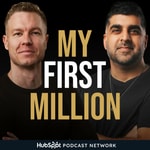The Daily – Details, episodes & analysis
Podcast details
Technical and general information from the podcast's RSS feed.

The Daily
The New York Times
Frequency: 1 episode/114d. Total Eps: 13

Recent rankings
Latest chart positions across Apple Podcasts and Spotify rankings.
Apple Podcasts
No recent rankings available
Spotify
🇩🇪 Germany - news
29/07/2025#36↗🇬🇧 Great Britain - news
29/07/2025#21↘🇬🇧 Great Britain - top
29/07/2025#174↗🇺🇸 USA - trending
29/07/2025#20↘🇺🇸 USA - top
29/07/2025#11↘🇺🇸 USA - news
29/07/2025#2→🇩🇪 Germany - news
28/07/2025#37→🇬🇧 Great Britain - news
28/07/2025#20↗🇺🇸 USA - news
28/07/2025#2→🇺🇸 USA - top
28/07/2025#10↘
Shared links between episodes and podcasts
Links found in episode descriptions and other podcasts that share them.
See allRSS feed quality and score
Technical evaluation of the podcast's RSS feed quality and structure.
See allScore global : 43%
Publication history
Monthly episode publishing history over the past years.
It Sucks to Be 33
jeudi 14 mars 2024 • Duration 26:27
Jeanna Smialek, who covers the U.S. economy for The Times, will be 33 in a few weeks; she is part of a cohort born in 1990 and 1991 that makes up the peak of America’s population.
At every life stage, that microgeneration has stretched a system that was often too small to accommodate it, leaving its members — so-called peak millennials — with outsize economic power but also a fight to get ahead.
Guest: Jeanna Smialek, a U.S. economy correspondent for The New York Times.
Background reading:
- When millennials gripe that they get blamed for everything, the accusers might actually be onto something.
- Millennials have the children, but boomers have the houses.
For more information on today’s episode, visit nytimes.com/thedaily. Transcripts of each episode will be made available by the next workday.
Unlock full access to New York Times podcasts and explore everything from politics to pop culture. Subscribe today at nytimes.com/podcasts or on Apple Podcasts and Spotify.
The New Co-Hosts of 'The Daily'
mardi 3 juin 2025 • Duration 09:37
Rachel Abrams and Natalie Kitroeff officially join Michael Barbaro as co-hosts of the show. Welcome to the next chapter.
Unlock full access to New York Times podcasts and explore everything from politics to pop culture. Subscribe today at nytimes.com/podcasts or on Apple Podcasts and Spotify.
The Sunday Read: ‘This Is the Holocaust Story I Said I Wouldn’t Write’
dimanche 4 mai 2025 • Duration 01:06:46
When Taffy Brodesser-Akner became a writer, Mr. Lindenblatt, the father of one of her oldest friends, began asking to tell his story of survival during the Holocaust in one of the magazines or newspapers she wrote for. He took pride in telling his story, in making sure he fulfilled what he felt was the obligation of all Holocaust survivors, which was to remind the world what had happened to the Jews.
His daughter Ilana knew it was a long shot but felt obligated to pass on the request — it was her father, after all. Taffy declined because after a life hearing about the Holocaust, she said, she was “all Holocausted out.”
But, years later, when she learned of Mr. Lindenblatt’s imminent passing, Taffy asked herself what would become of stories like his if the generation of hers that was supposed to inherit them had taken the privilege that came with another generation’s survival and decided not to listen?
So here it is, an old Jewish story about the Holocaust and a man who somehow survived the pernicious, organized and intentional genocide of the Jews. But right behind it, just two generations later, is another story, one about the children and grandchildren who have been so malformed by the stories that are their lineage that some of them made just as eager work of running from it, only to find themselves, same as anything you run from, having to deal with it anyway.
Unlock full access to New York Times podcasts and explore everything from politics to pop culture. Subscribe today at nytimes.com/podcasts or on Apple Podcasts and Spotify.
The Sunday Read: ‘What I Found on the 365-Mile Trail of a Lost Folk Hero’
dimanche 23 mars 2025 • Duration 51:05
Sometime in the 1850s or ’60s, at a terrible moment in U.S. history, a strange man seemed to sprout, out of nowhere, into the rocky landscape between New York City and Hartford, Conn. The word “strange” hardly captures his strangeness. He was rough and hairy, and he wandered around on back roads, sleeping in caves. Above all, he refused to explain himself. As one newspaper put it: “He is a mystery, and a very greasy and ill-odored one.” Other papers referred to him as “the animal” or (just throwing up their hands) “this uncouth and unkempt ‘What is it?’”
But the strangest thing about the stranger was his suit.
Unlock full access to New York Times podcasts and explore everything from politics to pop culture. Subscribe today at nytimes.com/podcasts or on Apple Podcasts and Spotify.
The Sunday Read: ‘Ghosts on the Glacier’
dimanche 7 janvier 2024 • Duration 01:16:30
Fifty years ago, eight Americans set off for South America to climb Aconcagua, one of the world’s mightiest mountains. Things quickly went wrong. Two climbers died. Their bodies were left behind.
Here is what was certain: A woman from Denver, maybe the most accomplished climber in the group, had last been seen alive on the glacier. A man from Texas, part of the recent Apollo missions to the moon, lay frozen nearby.
There were contradictory statements from survivors and a hasty departure. There was a judge who demanded an investigation into possible foul play. There were three years of summit-scratching searches to find and retrieve the bodies.
Now, decades later, a camera belonging to one of the deceased climbers has emerged from a receding glacier near the summit and one of mountaineering’s most enduring mysteries has been given air and light.
This story was recorded by Audm. To hear more audio stories from publications like The New York Times, download Audm for iPhone or Android.
Unlock full access to New York Times podcasts and explore everything from politics to pop culture. Subscribe today at nytimes.com/podcasts or on Apple Podcasts and Spotify.
The Sunday Read: ‘It Was Just a Kayaking Trip. Until It Upended Our Lives.’
dimanche 8 mai 2022 • Duration 01:00:34
It was meant to mark the start of their lives out of college, but the adventure quickly turned into a nightmare. Beginning with what seemed to be a lucky whale sighting, three friends set out on a sea-kayaking trip through Glacier Bay National Park in Alaska, watching out for bears, and having a good time, when tragedy struck.
In recounting the days preceding and following the accident, which seriously injured one of his friends, the Times journalist Jon Mooallem explains how he was forced to reckon with his fears. Detailing the incident’s surprising repercussions, he muses on the importance of overcoming one’s fears, and finding poetry in life’s darkest moments.
This story was written by Jon Mooallem. To hear more audio stories from publications like The New York Times, download Audm for iPhone or Android.
Unlock full access to New York Times podcasts and explore everything from politics to pop culture. Subscribe today at nytimes.com/podcasts or on Apple Podcasts and Spotify.
The Sunday Read: ‘Who Is the Bad Art Friend?’
dimanche 24 octobre 2021 • Duration 01:08:25
On June 24, 2015, Dawn Dorland, an essayist and aspiring novelist, did perhaps the kindest, most consequential thing she might ever do in her life. She donated one of her kidneys — and elected to do it in a slightly unusual and particularly altruistic way. As a so-called nondirected donation, her kidney was not meant for anyone in particular, but for a recipient who may otherwise have no other living donor.
Several weeks before the surgery, Ms. Dorland decided to share her truth with others. She started a private Facebook group, inviting family and friends, including some fellow writers from GrubStreet, the Boston writing center where she had spent many years learning her craft.
After her surgery, she posted something to her group: a heartfelt letter she’d written to the final recipient of the surgical chain, whoever they may be. Ms. Dorland noticed some people she’d invited into the group hadn’t seemed to react to any of her posts. On July 20, she wrote an email to one of them: a writer named Sonya Larson.
A year later, Ms. Dorland learned that Ms. Larson had written a story about a woman who received a kidney. Ms. Larson told Ms. Dorland that it was “partially inspired” by how her imagination took off after learning of Ms. Dorland’s donation.
Art often draws inspiration from life — but what happens when it’s your life?
This story was recorded by Audm. To hear more audio stories from publications like The New York Times, download Audm for iPhone or Android.
Unlock full access to New York Times podcasts and explore everything from politics to pop culture. Subscribe today at nytimes.com/podcasts or on Apple Podcasts and Spotify.
The Eclipse Chaser
lundi 8 avril 2024 • Duration 29:31
Today, millions of Americans will have the opportunity to see a rare total solar eclipse.
Fred Espenak, a retired astrophysicist known as Mr. Eclipse, was so blown away by an eclipse he saw as a teenager that he dedicated his life to traveling the world and seeing as many as he could.
Mr. Espenak discusses the eclipses that have punctuated and defined the most important moments in his life, and explains why these celestial phenomena are such a wonder to experience.
Guest: Fred Espenak, a.k.a. “Mr. Eclipse,” a former NASA astrophysicist and lifelong eclipse chaser.
Background reading:
- A total solar eclipse is coming. Here’s what you need to know.
- Millions of people making plans to be in the path of the solar eclipse on Monday know it will be awe-inspiring. What is that feeling?
- The eclipse that ended a war and shook the gods forever.
For more information on today’s episode, visit nytimes.com/thedaily. Transcripts of each episode will be made available by the next workday.
Unlock full access to New York Times podcasts and explore everything from politics to pop culture. Subscribe today at nytimes.com/podcasts or on Apple Podcasts and Spotify.
100 Years of ‘The Great Gatsby’
vendredi 25 juillet 2025 • Duration 41:52
This year, “The Great Gatsby” turns 100.
A.O. Scott, a critic at large for The New York Times Book Review, tells the story of how an overlooked book by a 28-year-old author eventually became the great American novel, and explores why all of these decades later, we still see ourselves in its pages.
Guest: A.O. Scott, a critic at large for The New York Times Book Review, writing about literature and ideas.
Background reading:
For more information on today’s episode, visit nytimes.com/thedaily. Transcripts of each episode will be made available by the next workday.
Photo: Abigail Cole/University of South Carolina Libraries
Unlock full access to New York Times podcasts and explore everything from politics to pop culture. Subscribe today at nytimes.com/podcasts or on Apple Podcasts and Spotify.
'The Interview': Robert Reich Thinks the Baby Boomers Blew It
samedi 26 juillet 2025 • Duration 43:30









